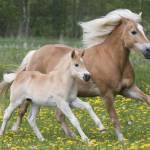L-Arginine Supplementation in Mare Reproduction

Because they are seasonally anestrus and have high rates of early embryonic death, mares provide unique reproductive challenges compared with other domesticated species, like cows and sows. Considering the short window that breeders and their veterinarians have to prepare their mares to breed on foal heat, wouldn’t it be noteworthy to discover a supplement that improved reproductive efficiency in mares? According to a group of researchers from the University of Florida, L-arginine might just help this process.
Over the past several years, scientists have discovered that L-arginine is more than just an essential amino acid serving as a basic building block for protein. Instead, L-arginine is now known for playing important roles in the functioning of the immune, cardiovascular, and endocrine systems.
“Based on studies conducted in pigs, L-arginine supplementation appeared to enhance blood flow to the placenta and improve the fetal environment, resulting in improved litter survival and live birth weights,” explained Kentucky Equine Research nutritionist Kathleen Crandell, Ph.D.
Hoping these positive effects would translate to mares, the Florida research team began experimenting with L-arginine supplementation in pregnant mares*. In previous studies, positive effects were noted after offering 100 g of L-arginine per day beginning 21 days prior to foaling and for 30 days after foaling. Specifically, mares supplemented with L-arginine had enhanced blood flow to the ovarian follicle (where the mare ovulates from), smaller uterine body and horns, and less fluid in the uterus after foaling compared to unsupplemented mares.
Their conclusion, that “the combination of reducing uterine fluid accumulation, while not altering follicular development, raises the possible use of L-arginine supplementation as a breeding management tool during the postpartum period to increase reproductive success,” prompted additional studies on dosing and safety**,***.
Key findings were that supplementing mares with 1% of their daily dietary intake of feed with L-arginine reduced the absorption of other amino acids, such as lysine, methionine, histidine, and proline. Once L-arginine was decreased to 0.5% dietary intake, this effect was not observed. Further, 0.5% L-arginine supplementation for the last 90 days of gestation through 14 days postpartum had no apparent deleterious effects on foal health, and a significant decrease in uterine fluid was noted compared to unsupplemented mares.
“Fluid in the uterus decreases reproductive efficiency because the fertilized egg cannot attach to the wall of the uterus to form a placenta. Therefore, less fluid in the uterus postpartum may contribute to improved conception rates when breeding on foal heat,” explained Crandell.
Although no other reproductive parameters were impacted by supplementing with 0.5% body weight L-arginine, the study authors concluded that the “study does demonstrate that nutritional intervention can aid in postpartum clearance of uterine fluid in horses.”
*Kelley, D.E., L.K. Warren, and C.J. Mortensen. 2013. Oral L-arginine supplementation impacts several reproductive parameters during the postpartum period in mares. Animal Reproduction Science. 38(3-4):233-240.
**Kelley, D.E., L.K. Warren, and C.J. Mortensen. 2014. Orally supplemented L-arginine impairs amino acid absorption depending on dose in horses. Journal of Animal Science. 92(12):5560-5566.
***Mesa, A.M., L.K. Warren, J.M. Sheehan, et al. 2015. L-Arginine supplementation of 0.5% of diet during the last 90 days of gestation and 14 days postpartum reduced uterine fluid accumulation in the broodmare. Animal Reproduction Science. 159:46-51.








